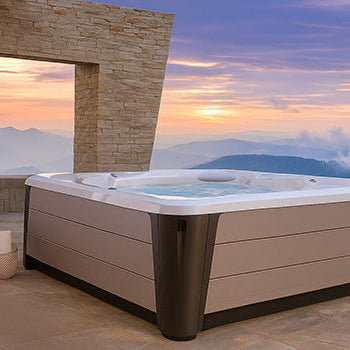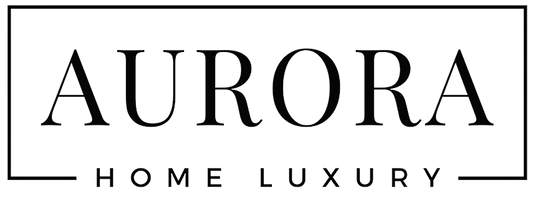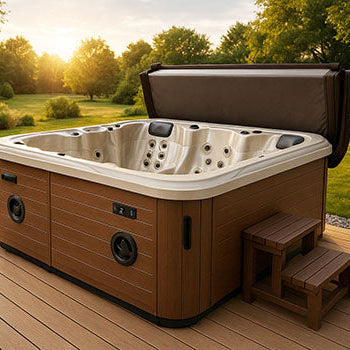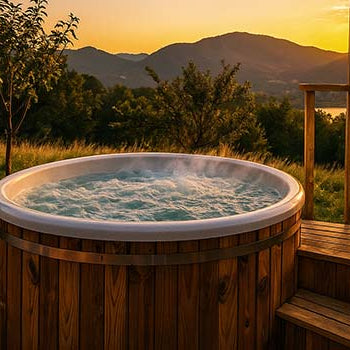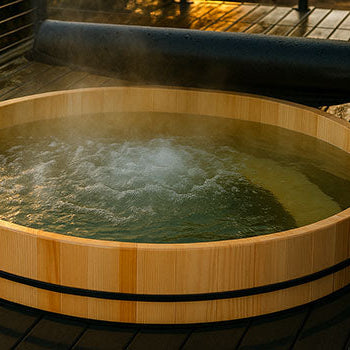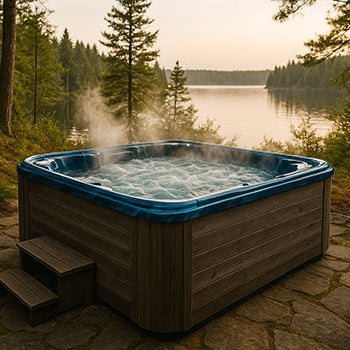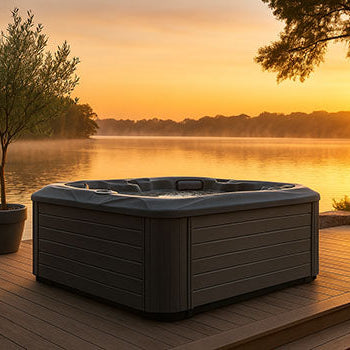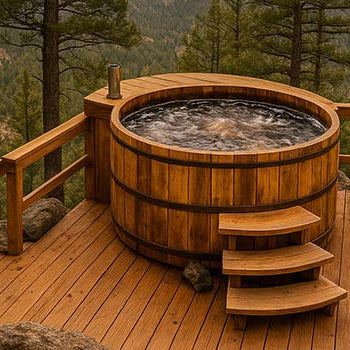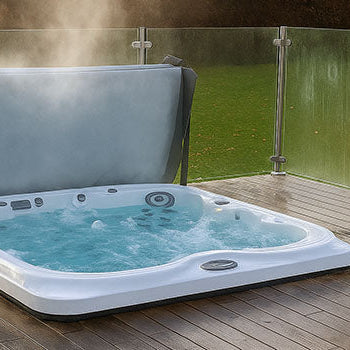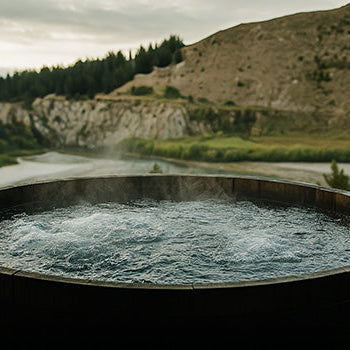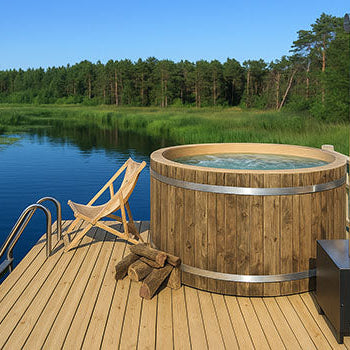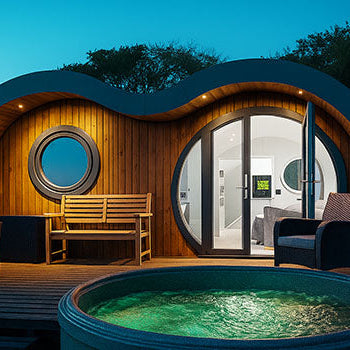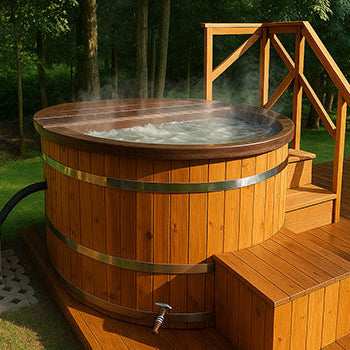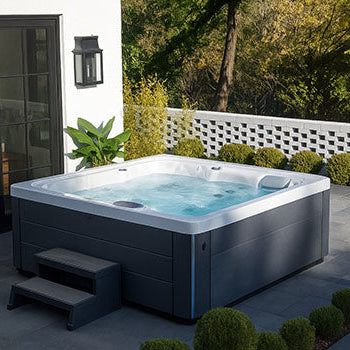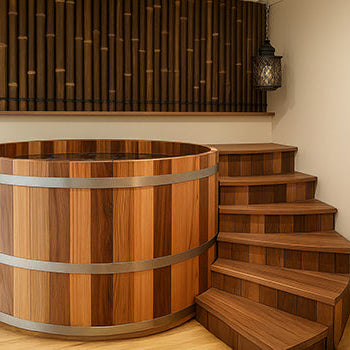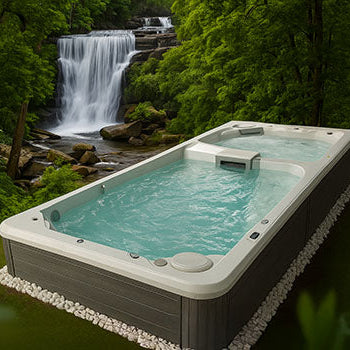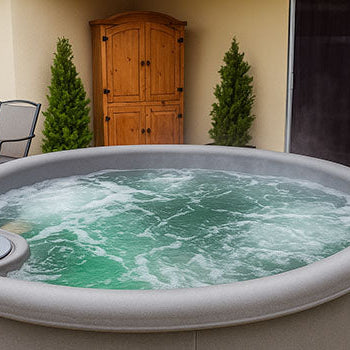Craving a good soak but got a baby on board? Short answer: Hot tubs aren’t completely off-limits, but the risks are real. From ultra-sleek Acrylic Hot Tubs to rustic Wooden Hot Tubs and more portable Rotomoulded ones, it’s not just about the bubbles, it’s about your baby’s safety too.
So, should you hop in or sit this one out? Keep reading to find out what’s safe, what’s not, and how to enjoy relaxation without the risks.

The Primary Concern: Risk of Overheating (Hyperthermia)
How Hot Tubs Raise Core Body Temperature
A dip in the hot tub might sound like heaven for sore backs and tired feet, but here’s the catch: that soothing heat can raise your core body temperature fast.
Even just 10 minutes in water hotter than 37–38°C can push your internal temperature beyond what’s safe during pregnancy.
Your body’s already working overtime growing a baby, so throwing it into overheat mode isn’t ideal.
It’s not about comfort levels, either. Even if you feel fine, your core temperature could be rising without you noticing.
Potential Risks of Maternal Hyperthermia to Fetal Development
When your body temperature goes too high, there’s a risk that it could affect how your baby develops.
It’s especially concerning early in pregnancy when all the vital structures are forming.
Studies suggest that excessive maternal heat exposure may disrupt cellular development and increase the likelihood of birth defects.
The science isn’t meant to scare you, it’s there to guide safe choices.
Link to Neural Tube Defects (Especially in First Trimester)
Here’s the part that makes doctors cautious: the first 12 weeks are when the baby’s neural tube forms.
That’s the foundation for the brain and spinal cord. If your body temperature spikes too high during this time, it could raise the risk of issues like spina bifida.
That’s why many health professionals say: avoid hot tubs altogether during the first trimester.
It’s a short-term pause for long-term peace of mind.
Official UK Health Recommendations and Guidelines
NHS Advice on Avoiding Hot Tubs and Saunas During Pregnancy
The NHS takes a no-nonsense stance. Pregnant women are advised to avoid hot tubs, saunas, and steam rooms.
Why? Because they all share one thing, heat. And heat raises your core temperature.
Even a short soak in a steamy tub can push you past safe levels, especially early on.
It’s not about banning comfort, but prioritising safety for both mum and baby.
Why the First Trimester is Considered Highest Risk
The early weeks of pregnancy are a whirlwind of rapid development.
Every organ, limb, and nerve pathway is beginning to form.
That’s why any disruptions during this period, including elevated temperature, can carry serious consequences.
Once you’re past the first trimester, there’s a bit more flexibility, but even then, it’s about balance and being careful.
Other Potential Risks to Consider
Dehydration and Fainting Risk Due to Blood Pressure Changes
Hot tubs make you sweat. You may not notice it in water, but your body is losing fluids.
Dehydration during pregnancy isn’t just uncomfortable, it can lead to dizziness, headaches, and low blood pressure.
Add in the heat and your already-shifting circulation, and the chance of fainting increases.
Standing up too quickly after a soak can leave you light-headed, or worse, on the floor.
Increased Susceptibility to Infections (Water Hygiene Concerns)
Not all hot tubs are created equal.
Even well-maintained ones like top-end Acrylic Hot Tubs or classic Wooden Hot Tubs can harbour bacteria if hygiene isn’t spot-on.
During pregnancy, your immune system changes to support the baby.
This makes you more vulnerable to infections, like UTIs, skin irritations, or worse.
If you wouldn’t drink the water, you probably shouldn’t sit in it either.

If Considering Hot Tub Use Later in Pregnancy (Strict Precautions Advised)
Essential: Consulting Your Midwife or GP First
Before making any spa-day plans, check in with your midwife or GP.
They know your medical history and any risks specific to your pregnancy.
Even if your pregnancy is low-risk, personalised advice always trumps generic tips online.
Think of it as a wellness green light, or a red flag you didn’t know to look for.
Strict Temperature Control (Maximum 37–38°C, Never near 40°C)
If your doctor gives you the go-ahead, set your hot tub to “gentle hug,” not “boil-your-muscles.”
Keep it under 38°C, anything higher edges into risky territory.
Many Rotomoulded Hot Tubs have easy-to-read digital panels.
Use them! And always double-check with a thermometer for accuracy.
Limiting Soak Time (Maximum 10 Minutes)
Time flies when you’re relaxing, but ten minutes is your safety cut-off.
More than that, your core temp may start climbing too fast.
Set a timer or have someone keep track.
It’s not about ruining the fun, it’s about protecting your tiny passenger.
Ensuring Excellent Water Sanitation and Hygiene
If your hot tub hasn’t been cleaned recently, skip it.
Sanitation is absolutely non-negotiable during pregnancy.
Public tubs can be especially risky, where dozens of others have used it before you.
At home, check filters, chlorine levels, and maintenance logs before each soak.
Avoiding Water Jets Aimed Directly at the Abdomen
Strong jets feel amazing on your back, but avoid letting them hit your bump directly.
There’s a risk of increased pressure or stimulation to the uterus, which you definitely don’t want.
Stick to gentle settings aimed at your lower back or legs.
It’s safer, and still blissfully relaxing.
Getting Out Immediately if Feeling Unwell or Too Hot
Pay attention to your body’s signals.
If you feel dizzy, flushed, weak, or too warm, get out immediately.
Those are signs your body’s telling you it’s had enough.
Grab a towel, cool off, and sip some water.
Staying Well Hydrated
Speaking of water, drink it!
Hydration is key before, during, and after any time spent in heated water.
Keep a big bottle nearby and sip throughout your soak.
Your body (and baby) will thank you for it.
Safer Alternatives for Relaxation During Pregnancy
Warm (Not Hot) Baths
Love a good soak? A warm bath can still give you that spa feel, just without the risk.
Keep the water comfy, not steamy.
Add calming music, a pregnancy-safe bath soak, or a few candles.
Voilà: safe luxury in your own bathroom.
Swimming in Cooler Pools
Swimming is a brilliant way to stay fit and cool.
Cooler pools offer all the relaxation of water, minus the overheating risks.
They also take pressure off your joints and give your body a lovely sense of weightlessness.
That alone might be worth it in your third trimester!
Prenatal Massage or Yoga
If you’re looking for stress relief, a certified prenatal massage or gentle yoga session can do wonders.
These options improve circulation, ease back pain, and calm your nervous system.
Plus, there’s no temperature worries, just stretch, breathe, and relax.

Conclusion: Hot Tubs Pose Risks During Pregnancy; Avoidance is Safest, Especially in First Trimester. Strict Guidelines Apply if Used Later Under Medical Advice.
To wrap it up: hot tubs can pose serious risks if you’re pregnant, especially in the first trimester.
Overheating, fainting, or picking up an infection is no way to unwind.
If you’re past 12 weeks and feeling tempted, ask your midwife first and follow every safety rule.
Even high-end Wooden Hot Tubs or personal spa setups aren’t risk-free without proper control.
And remember, relaxation doesn’t always mean bubbles and jets.
Sometimes, a quiet swim or a warm bath is exactly what your body (and baby) needs.
